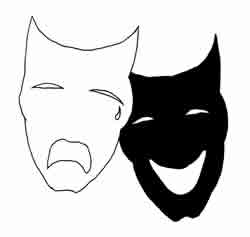Anyone who’s ever worked at the Northwest Actors Studio—the city’s oldest acting school and long a favorite rental for small fringe companies—has stories about it. When I was producing Carlotta’s Late Night Wing-Ding in the upstairs cabaret space several years ago, we had drunks wandering in midshow, a fistfight or two, some recurrent dog pee on the floor, and a burglary of the dressing room during a performance. (That’s in addition to the chaos onstage.) Probably no other venue in Seattle has these sorts of problems, but then no other venue I know has couches instead of chairs, quirky (sometimes to the point of bizarre) volunteers, or rent for visiting companies that is so cheap.
On reflection, maybe their rent was too cheap. When Tom Ansart took over as the Studio’s (unpaid) managing director in September and had a look at the books, he realized he’d walked into a financial crisis. A bank line of credit had been maxed out, rent was unpaid, a former staffer was demanding $3,000 in unpaid salary, and even the photocopier was in danger of being repossessed. He was able to resolve some of the problems, including getting a $12,000 rebate from the city for overpaid B&O taxes, but at the beginning of December, he sent out a call to the theater community to help raise cash and provide volunteer performers for fund-raisers.
“When you get a three-day eviction notice,” he says, “you have to take it seriously.”
How seriously seems to be a matter of debate, though. Ansart, who left the managing director position last month but is continuing to help with fund-raising, thinks the theater could close as early as March if it doesn’t raise $25,000. But NWAS founder and artistic director Anne Graham is more optimistic. When asked when the Studio might have to close, she answers firmly, “We won’t.” Whether her optimism is founded on a secret plan or is merely wishful thinking isn’t clear to me.
NWAS operates in what could charitably be called “organized chaos.” “If you’re used to traditional arts organization models, you’d say this place is crazy, and it is crazy,” says Ansart, who turned down a paid management gig to help the Studio out. “Half the time there’s no staff around, and renters, teachers, and artists have to sort things out. It’s sort of an open collective, and that leads to some bickering.”
The Studio inhabits the top two floors of a converted auto-repair garage, dark and labyrinthine, chilled in the winter and baking in the summer. Its two venues are a 99-seat black box that’s as long as a small bowling alley and a 49-seat cabaret space with a small stage. The place is shabby, drafty, and weirdly cozy.
The school offers budget classes in everything from basic acting to voice and film work and burlesque striptease. Most classes are a couple hundred bucks or less, and a year on the Conservatory program (a two-year course for serious acting students) will set you back only $3,600, quite a bargain these days.
Graham hopes that a series of fund-raisers —including a reprise of NWAS teacher Anthony Curry’s solo show, UFO—and the help of a few key donors will save the day and stabilize the institution, but Ansart’s not so sure. “I know Anne would like to keep things running pretty much as they are, but I think we really need to consider some new things,” he says. “Maybe a resident company in the cabaret space, or a collective of theater companies who could ensure regular rentals—I’m open to suggestions. This is a great place, but it can’t continue like this. We’re in the last year of a 10-year lease. Even if we squeak through this year by some miracle, we’ve got to make some major changes.”
<p class="excerpt"








